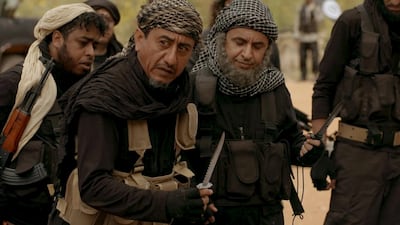A Saudi sketch comedy show lampooning ISIL has caused a stir and divided public opinion, with some people championing the series and others denouncing it as insulting to Islamic rituals. Two commentaries featured in the Saudi-funded daily Asharq Al Awsat reflected the two main opinions among Arab writers.
Hussein Shobokshi wrote that the response to the satirical television series Selfie, which is being aired by the Saudi-owned MBC channel this Ramadan, was shocking. Two episodes that sneered at ISIL had generated a huge number of negative comments on social media, including death threats from the militant group, he said.
The episodes, which laid bare the group’s monstrous and destructive ideology, were like an electric shock, the writer noted. Hundreds of commentators attacked the makers of the series for “insulting religion and its symbols”. Oddly, many of those commentators had also condemned ISIL, saying its actions had nothing to do with Islam.
Shobokshi said that the show's star, Nasser Al Qasabi, was used to these kind of attacks. The Saudi comic was subject to similar reactions when he acted in the popular, long-running satirical comedy Tash Ma Tash, which attracted complaints from conservatives, hardliners and extremists alike.
Shokbokshi said Selfie had shown "remarkable progress" in its treatment of extremism and terror, with a watertight script by Khalaf Al Harbi and a solid performance by Al Qasabi.
But tackling terrorism and extremism in Arab films and drama series is not new. Many prominent works have been made about the issue, including The Terrorist, an Egyptian film starring comic Adel Imam; the Egyptian TV series The Family, starring Mahmoud Morsy; and the Syrian series El Hur El Ein ("Beautiful Maidens") and Ma malakat Aymanukum ("Slave Girls").
Shoboskshi said the problem with the people who objected to the Selfie episodes about ISIL was that they deemed the product to be insulting to religion, yet at the same time they maintain that ISIL does not in any way represent Islam. By so doing, they were diverting attention from exposing ISIL to attacking Al Qasabi, Al Harbi and the channel airing the series.
He went on to say that Al Qasabi and Al Harbi were not the first to receive threats from extremists in Saudi Arabia and the wider region. Certain people believe they can “get close” to God by hurling insults and threats at people they do not agree with, or even by killing them.
Striking a different tone, Hamad Al Majed noted that any programme, serious or satirical, has a right to place anybody's actions under the microscope. However, what the Selfie enthusiasts had failed to understand was that having good intentions does not necessarily mean doing something right.
A doctor, while keen on treating his patients, is held accountable in case of medical error, or a well-meaning parent trying to discipline their children might slide into abuse, thus making things worse, he wrote.
The people behind Selfie say it is meant to highlight the issue of "trading on religion", a real plague in the region. But while doing so, the series has disrespected some Islamic rituals, ridiculed the Arabic language and fallen into generalisations, Al Majed said.
He noted that it was too early to give a final verdict for or against Selfie, so he was focusing on the episodes aired so far that had tried to tackle the issue of terrorism that has plagued Syria and Iraq.
There is nothing wrong with that, Al Majed wrote, because comedy is an efficient means for fighting dangerous phenomena. And Selfie defenders knew that the "ISIL virus" had affected some Saudis along with other people in Arab and western countries.
Those who have celebrated the series have talked about exposing the clerics who urge young people to join ISIL and other terrorist groups. However, the writer said, the vast majority of clerics have condemned ISIL and similar groups. Some of them have been attacked and threatened by ISIL, too.
The writer said the filmmakers had twisted the facts, with the end result of defaming the country by suggesting that it exported terrorists and encouraged people to join extremist groups.
With this provocative approach, Selfie had spoiled an opportunity to push for change and reform social woes, especially among conservative religious figures and the conservative public at large. Now, these people regard the series as lacking in credibility or even as an attack on religion itself. The reaction would not have been so had Selfie avoided lampooning religious rituals, the writer remarked.
Hopefully, upcoming episodes will succeed in portraying other social issues such as moral decadence, sexual harassment, drugs and atheism, the writer concluded.
Translated by Abdelhafid Ezzouitni
aezzouitni@thenational.ae

